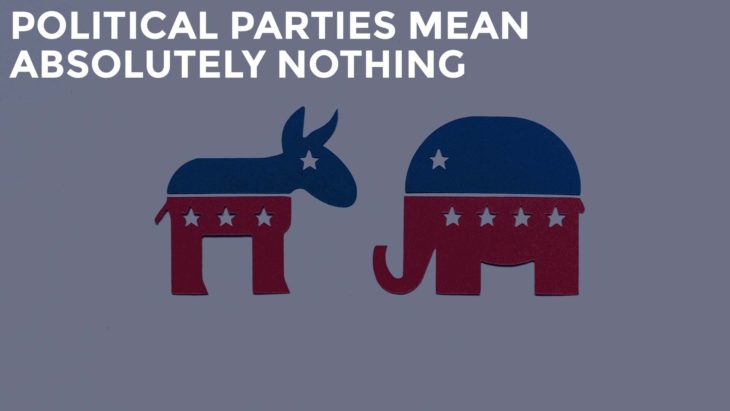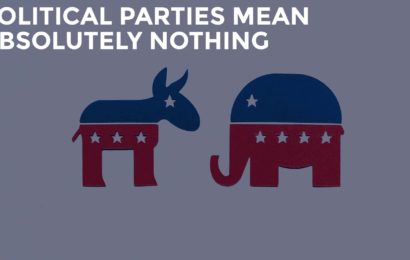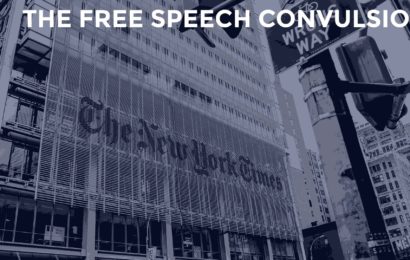
Political Parties Mean Absolutely Nothing
America only has two major political parties. That’s the way it’s always been and likely always will be. Third parties have bubbled up in the past but they popped just as quickly, and no third party has had any reasonable share of the electorate in about 80 years. Political parties began with the very first presidency. Opposers of George Washington (Alexander Hamilton opposers, really) organized into the Anti-Administration faction. Thomas Jefferson organized them into the Democratic-Republicans, which is now the Democratic Party. Hamiltonians organized into the Federalists. There were tumults and realignments, but they basically became the Whig Party. For about 60 years, the two political parties were the Whigs and the Democrats. The Whigs couldn’t come up with a coherent position on slavery – Democrats loved slavery. Say what you will, but at least it’s an ethos – and so they became irrelevant. Republicans were created from the anti-slavery Whigs. Ever since 1860, the only two parties have been the Republicans and Democrats. How the anti-slavery party was taken over by racists is a whole nother issue.
There are a lot of valid, non-corrupt reasons we have only ever had two parties at a time: first-past-the-post voting, the Electoral College, ideological diversity of the parties, blah blah blah. Suffice it to say, no third party will ever challenge the duopoly*. If something has never happened, it likely won’t happen. So, we’re stuck with Democrats and Republicans. How do we save America while also accepting that we’ll always have the red team and the blue team?
Political Parties Are Weaker Than Ever
Presidential politics gets all the attention, so let’s start there. Prior to 1972, presidential candidates were chosen at their party conventions. Each state party would send a delegation to the convention based on some byzantine math. Nine delegates from Alabama, eleven from Texas, etc etc. They would cast their votes for who they wanted to be their party’s nominee. There was a lot of backroom dealing and favor exchanging. These were literal smoke-filled rooms where decisions were made. After 1972, states began choosing who their delegates would vote for through the primary process. This was supposed to be a win for democracy. Hooray! Power to the people.
The result? It broke America.
In 2016, a racist game show host became the Republican nominee despite the wishes and efforts of the Republican Party power brokers. It’s easy to forget now, but most notable Republicans were opposed to Trump for the majority of the primary process. He was unqualified to be president, he did a poor job as president, and he destroyed a 230-year streak of peaceful transfers of the presidency. None of this would have happened if people who have a stake in the health of the GOP had been the ones making the decisions.
But what about the power of the people? What about democracy?!?!?! Only about 10% of eligible voters even participate in presidential primaries; even fewer take part in down-ballot primaries during midterms. Then, the vast majority of Americans whine that “these are the only two choices?!?!?!” No, actually, in 2016, there were about 30 choices. Most Americans just sat out during the decisionmaking process. So, primaries aren’t democratic. Take it from me; I ran for the Alabama state legislature in 2022. I knew about 12,000 people would vote in the general election, but the Democratic primary would only be about 1,000 voters. For the primary, I spoke mainly to committed Democrats because I knew they were the only ones who were going to vote. I happen to be a decent person, so I said the same thing to the primary electorate and the general electorate. However, the result was basically already decided. I was going to win almost every Democratic voter who showed up in November. The Republican was going to win basically every Republican voter who showed up in November. So, all I needed to do to secure those Democratic votes was to win 50.1% of 1,000 primary voters. How is that significantly different than a hundred or so Democratic power brokers choosing me?
Political Parties Are Brands and Not Much Else
It’s popular, especially in younger leftist discourse, to say “the Dems did X” and “the Dems never Y.” It’s all nonsense. Parties have no control over what their candidates do or say. A candidate qualifies for a party’s ballot typically by paying a fee and submitting a form. That’s it. There’s no ideological questionnaire or anything (some state parties ban candidates who have openly supported the opposing party, but that’s mostly for state office and not federal).
In theory, a card-carrying communist could enter the Republican primary for dog-catcher. In a red district, Republican voters would just check the box next to his name and keep it pushing. Boom, just like that, a marxist is dog-catcher for Confederate County, Alabama. Alternately, a klansman could be the Democratic nominee for county commissioner of Wokety Woke, Oregon. There’s literally nothing stopping him. And when was the last time you knew every name on your ballot? Are you absolutely sure you’ve never voted for a Nazi or do you just check every name with your particular party affiliation?
When a party becomes a brand with no control over who gets their label, it invites grifters to flim-flam the brand-loyal customers. Just imagine if anybody could put the Coca-Cola logo on their soda bottles and sell it. You’d never quite know what you were getting, and every incentive would say I should just bottle some brown water and put a Coke label on it.
Won’t people notice that I’m selling chickenshit and calling it chicken salad? No. If you’re being honest with yourself, I think you’ll admit that you don’t know what your probate judge does every day. You’re not sure how your state senator votes. They fly under the radar once they’re elected.
So What Can You Do?
Primaries aren’t going anywhere. All you can do is vote in primaries. Every primary. And stop assuming that the party label actually means something. It’s just a label, and you have no idea what’s actually in the bottle.
*I’m not sure why this is so difficult to accept. The two political parties are 100+ years older than most sports teams but team market shares are considered total. Fans are loyal, and that loyalty is passed down from generation to generation. No amount of money and advertising could turn a Los Angeles Lakers fan into a Los Angeles Clippers fan, for example.






